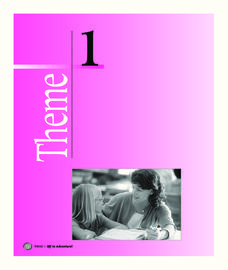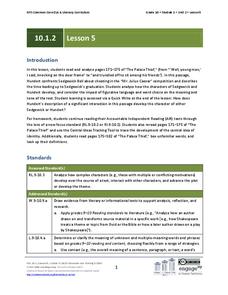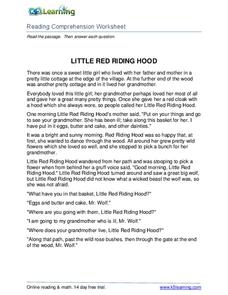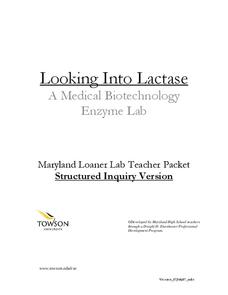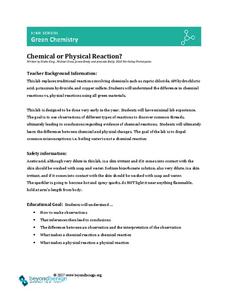Have Fun Teaching
Predict and Infer (22)
Encourage close reading and critical thinking with a worksheet that asks readers to select an event from a story, predict what they believe will happen, and list clues from the story that support this prediction. After completing...
Have Fun Teaching
Growing Seeds (9)
A seed, water, and sunlight. A seed, water, but no sunlight. A seed, sunlight, but no water. Young biologists are ask to infer what will happen to seeds given five different growing conditions.
Houghton Mifflin Harcourt
Off to Adventure!: Extra Support Lessons (Theme 1)
This packet, the third in the series of support materials for the Houghton Mifflin Harcourt thematic units titled "Off to Adventure!" contains exercises and drills designed for learners who need extra support with the...
EngageNY
Grade 10 ELA Module 1: Unit 2, Lesson 5
Readers of "The Palace Thief" focus on how the author's descriptions and word choices reveal the characters of the narrator, Sedgewick, and the senator.
Council for the Curriculum, Examinations and Assessment
Managing Influences and Making Decisions
Teenagers could use a little help with their decision-making process. Guide them through the steps of mature choices, outside influences, and expected consequences with a lesson about making decisions.
Montgomery K12
Clues in Sentences Investigation
Explore the variety of context clues that help us learn new meanings of unknown words! With this presentation, pupils go in depth into each type of context clue and have their knowledge tested with several small reading passages in which...
Hampton-Brown
Esperanza Rising
Accompany a reading of the novel, Esperanza Rising by Pam Muñoz Ryan, with a series of lessons that dive deep into the literary world of a young girl and the journey she takes to start a new life. Lessons and their...
Odell Education
Scientific Process and Experimental Design
The scientific method keeps you from believing only what you want to believe — it expands your mind. The lesson introduces the eight steps in the scientific process and how to design an experiment to biology scholars. Live insects...
Houghton Mifflin Harcourt
Around Town: Neighborhood and Community: Extra Support Lessons (Theme 3)
Neighborhood and community is the theme of a unit comprised of extra support lessons. Following practice pages and a teach, blend, guided practice, practice/apply routine, the series of lessons provide additional reinforcement...
Balanced Assessment
Movie Survey
Movie preferences will get your classes talking! Individuals read a pie graph and construct a bar graph using the same information. They then answer questions specific to the data and sample size.
K5 Learning
Humming Birds
Seeing a hummingbird in the wild can be a magical experience. Learn more about these delicate members of the animal kingdom with a short reading passage, complete with four short-answer questions.
K5 Learning
Little Red Riding Hood
Little Red Riding Hood brings lovely treats to her grandmother, and valuable reading skills to your pupils. After reading the short fairy tale, fifth graders answer four comprehension questions.
EngageNY
Grade 9 ELA Module 3, Unit 3, Lesson 4
The fourth activity in a unit on crafting a research paper focuses on cohesion within and between paragraphs. Class members examine models that lack cohesion and ones that are cohesive and logically developed before using what they have...
Columbus City Schools
Sedimentary Rocks
Turn your class discussion of rock formation from ho-hum to holy hornfels! Junior geologists gain experience in identifying rock types and rock origins, with an emphasis in hypothesizing the environment needed to form certain...
NOAA
Off Base
How does carbon dioxide affect the world's oceans? The final installment in a series of six lessons has pupils research ocean acidification, then conduct an experiment to witness the delicate balance that exists in our seas. Materials...
Trinity University
Explain Yourself: An Expository Writing Unit for High School
Introduce expository writing with a unit that asks writers to craft an essay to explain a belief, value, or priority that is important to them. Mini-lessons within the unit focus on crafting thesis statements and conclusions, selecting...
NOAA
A Quest for Anomalies
Sometimes scientists learn more from unexpected findings than from routine analysis! Junior oceanographers dive deep to explore hydrothermal vent communities in the fourth lesson in a series of five. Scholars examine data and look for...
Towson University
Looking Backwards, Looking Forward
How do scientists know what Earth's climate was like millions of years ago? Young environmental scholars discover how researchers used proxy data to determine the conditions present before written record. Grouped pupils gain experience...
Towson University
Mystery Tubes
How do scientists know they're right? Truth be told, they don't always know. Explore the scientific process using mystery tubes in an insightful activity. Young scientists discover how to approach and solve problems in science, how ideas...
Towson University
Case of the Crown Jewels
Can your biology class crack the Case of the Crown Jewels? Junior forensics experts try their hands at DNA restriction analysis in an exciting lab activity. The lesson introduces the concept of restriction analysis, teaches pipetting and...
Towson University
Looking Into Lactase: Structured Inquiry
Why is lactase important? Biology scholars explore enzyme function in a structured inquiry lab. The activity tasks lab groups with observing how temperature and pH affect enzyme activity, as well as determining which milk products...
Towson University
The Wildlife Forensics Lab
Can science put an end to the poaching of endangered species? Show your young forensic experts how biotechnology can help save wildlife through an exciting electrophoresis lab. Grouped pupils analyze shark DNA to determine if it came...
Curated OER
Go Fish!
So much science in one tiny fish! Introduce young biologists to the zebrafish, a common aquarium inhabitant. The small, unassuming organism presents an opportunity for learners to study habituation using an easy-to-care-for species. Lab...
Beyond Benign
Chemical or Physical Reaction?
Ready to take your chemistry class on its first big lab adventure? Dive in to differentiation between chemical and physical changes with a thoughtfully designed set of experiments! Partners conduct a series of reactions, describe their...
Other popular searches
- Making Inferences Worksheet
- Observation and Inferences
- Making Inferences in Reading
- Reading Making Inferences
- Making Inferences Grade 2
- Making Inferences Stories
- Lesson Making Inferences
- Inferences and Context Clues
- Generalizations / Inferences
- Inferences in Reading
- Reading Inferences
- Making Inferences 3rd Grade




